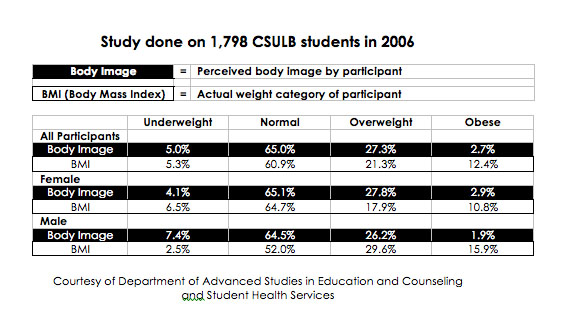New statistics report that more college students are becoming overweight and obese every year.
An ongoing student health-risk survey by Student Health Services (SHS) at Cal State Long Beach reveals that a number of factors are contributing to weight gain among young adults, including poor diet, lack of exercise, sedentary lifestyle and incorrect weight perception.
“All participants see themselves as normal,” said health educator Heidi Burkey. “[They] didn’t see themselves as overweight.”
Burkey and SHS Associate Director Paul Ratanasiripong have conducted several surveys that reveal how students perceive their health.
According to a poll of 1,798 students, 18.3 percent of male participants underreported being overweight, while Hispanics had the highest underreporting of obesity.
“This is a critical time to start implementing healthy lifestyle changes,” Burkey said.
According to the World Health Organization, more than 2 billion people are either overweight or obese. In the United States, overweight adults comprise about two-thirds of the population.
People generally accept their weight without thinking about it, said family and consumer science professor Gail Frank.
“The perception is that, ‘I’m okay and not overweight,'” Frank said. “Often, people don’t see the problems later on, unless the person has a really high body mass index.”
Early symptoms of weight-related problems can include shortness of breath, inability to walk for a long period of time without strain, and tiring easily, Frank said.
A common problem is that when students compare their weight to those around them, many think they are falling into a normal weight range. However, the individual’s weight may be far from what it should be for their height, Burkey said.
The report, titled “Normalizing Overweight and Obesity: Is It Deadly,” authored by Burkey and Ratanasiripong, shows that 70 percent of survey participants engaged in some sort of weight management, with exercise being the most common.
“Once you start to exercise, you feel proud,” Burkey said. “It’s self-efficacy. That’s a theory in health services that the more likely you feel proud, the more likely you are to do something again.”
CSULB students have taken notice of the growing epidemic and fought back their own way.
“I have a stomach condition, so I eat very vegetarian,” said Celia Mendelsohn, a senior graphic design major. “I think if we had more vegetarian options on campus, students would use them.”
Some student-athletes say they recognize the unhealthy conditions at CSULB.
“We need more healthy choices,” said Whitney Fields, a senior criminal justice major and basketball player. “I think we need a rec. center where you can work out and not have to pay. At Frog’s, you have to pay unless you’re a student-athlete.”
Fellow athletes agree that healthier food choices and more access to fitness equipment are a possible solution.
“We need more activities that we can do without having to pay,” said Juan Montano, a freshmen kinesiology major and lacrosse player. “Before lacrosse, I couldn’t work out. I had to pay for a membership.”
Attending college can have an adverse affect on a student’s health.
“Some people played sports in high school but in college, they can’t or don’t go into athletics,” Burkey said. “Students aren’t as active; they have to spend their time sitting through two- to three-hour classes and studying.”
Frank cites “health illiteracy” as a major issue facing CSULB students and young adults in general.
“Illiteracy is a strange term; most don’t understand it,” Frank said. “We lack knowing how to connect the dots. If we had one of those automated heart machines, like the ones you see at the pharmacy, it would be great. Students would be able to find out their blood pressure and see where they rank health-wise.”
In addition to better dietary choices, Frank has an idea to bring health awareness to the campus.
“It would be wonderful to have an annual health fair,” Frank said. “The American Heart Association could do screenings — a lot of the clubs already promote a healthy lifestyle. It would be the kind of thing that would start off small, then grow.”
The University Student Union Program Council is presenting its fourth annual health fair Feb. 24 from 11 a.m. to 2 p.m. in the Southwest Terrace. Starting March 1, the nutrition and dietetics department will also begin free health counseling and dietary planning.




